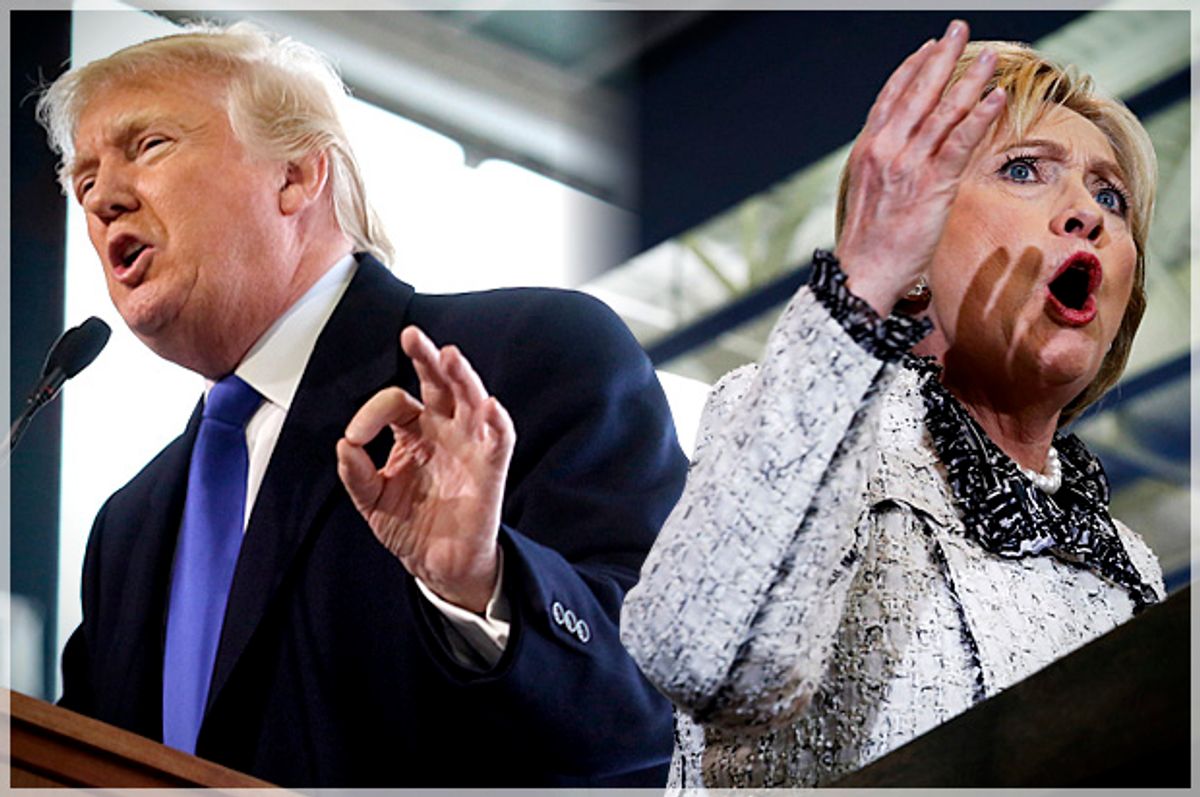It's generally understood that presidential elections are decided in the so-called swing states. Everything reduces to turnout. Which is why the ground game is so important: You can't get people to the polls without a sophisticated voter targeting operation, and thousands of staffers and volunteers on the ground doing the dirty work. To the extent that that's true, Republicans are in trouble.
A new Politico report confirms the GOP is way behind in all the states that matter. Because their nominee has no interest in data or analytics or infrastructure, the RNC is forced to shoulder the entire burden. By contrast, Clinton already has a political machine up and running in each of the swing states, and the DNC is coordinating with the campaign as it prepares to do the heavy lifting. Republicans, meanwhile, are hostage to the whims of their nominee. Trump doesn't do retail politics, so the party has no choice but to rely on his personality and media presence. While Democrats are focused on organization and digital operations, Republicans are hoping Trump's demagoguery will carry enough angry white men to the polls. “His job is to be Mr. Trump,” said Rob Gleason, who chairs the Pennsylvania Republican Party. “His appeal is very different than a normal politician...All he has to do is announce three days ahead of time he's going to be somewhere and a huge crowd shows up.” I admire the optimism, but surely Mr. Gleason knows circus-like crowds won't translate to election day turnout. Attracting people to spectacles is easy; getting them to the polls when it counts is not.
It's scarcely a plan, but GOP operatives are saying (publicly, at least) that Trump's cult of personality will energize disaffected blue collar workers in places like Michigan, Ohio, and Pennsylvania. And they assume that any anxieties about Trump's blinding incompetence will be eclipsed by hatred of Clinton. Again, I admire the optimism, but this is wish-thinking, not a strategy.
Logistics aside, the poll numbers in the 11 or so swing states also portend trouble for Republicans. Currently, Clinton holds a 5-point overall advantage over Trump according to Politico's polling average. She's leading in 8 of the 11 individual states (including Florida and Ohio), and those numbers are likely to improve as Trump continues to unravel and the Democrats unite behind their nominee. It's still early, but the numbers offer a snapshot of where the electorate is heading.
The national poll numbers tell the same story. A recent Bloomberg poll shows Clinton with a double-digit lead over Trump (49 percent to 37 percent), a noticeable spike since Clinton became the presumptive nominee. The gender gap is especially worrisome if you're a Republican. 63 percent of women say they could never vote for the Republican nominee. Women represent a majority of voters – if 2 out of 3 won't vote for Trump, the race is over before it begins.
The groups that will decide the election, particularly in swing states, are also strongly opposed to Trump. Clinton is winning 57 percent of women, 58 percent of single voters, and 77 percent of non-whites. Trump is doing far better among white men, but that won't compensate for his negatives among every other demographic. Besides, Trump's appeal with white men is often overstated. As Bloomberg's John McCormick pointed out, “White men are among Trump's strongest demographics. But even there he's not showing as much strength as the party's last nominee, Mitt Romney, who beat Obama in 2012 by 62 percent to 35 percent among white men.” (Trump is currently at 50 percent).
The closer you look at the numbers and the more obvious the organizational gap becomes, the harder it is to see a path to victory for Trump. He's quickly confronting the limits of his amateurish, media-centric campaign. Anything is possible in November, but there's no question that Republicans are comparatively disadvantaged. They're led by an organizationally inept candidate who can't appeal to women and non-whites and has proven himself incapable of compromise.
Good luck with that.

Shares